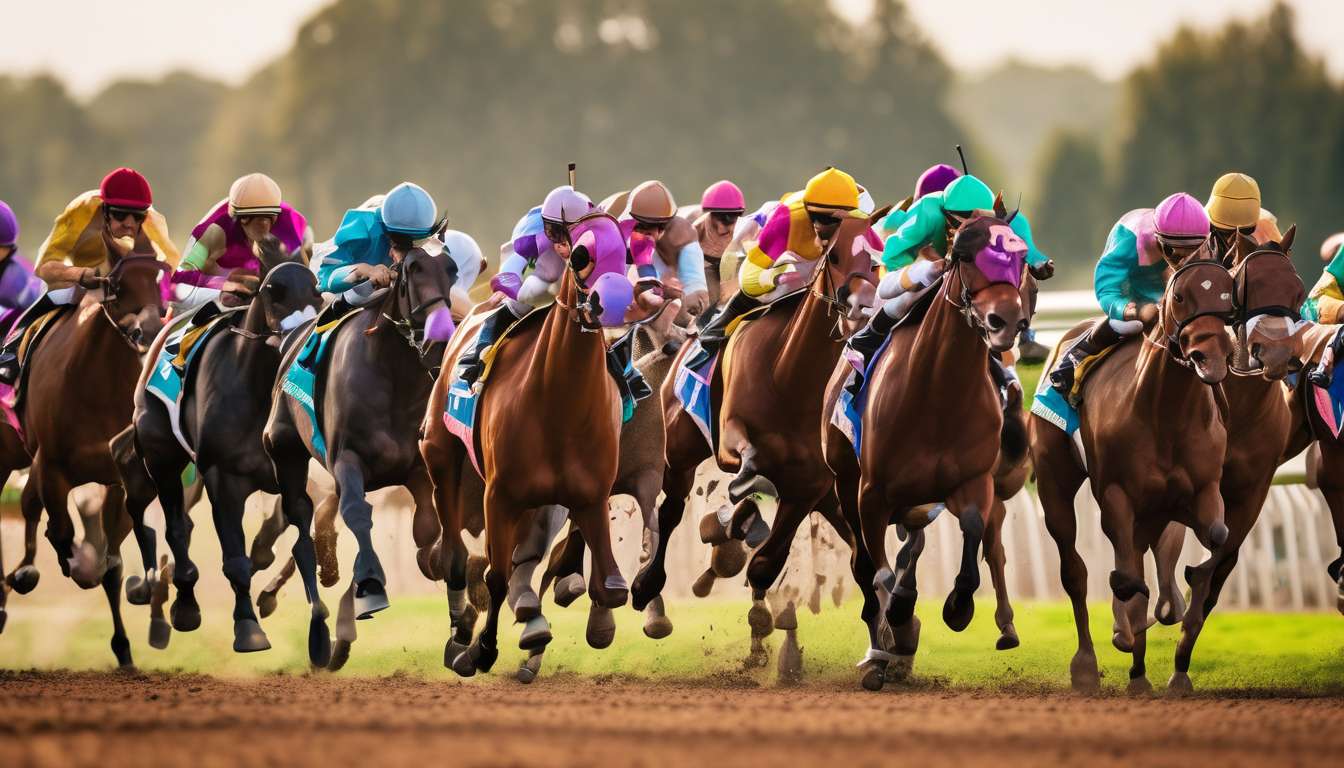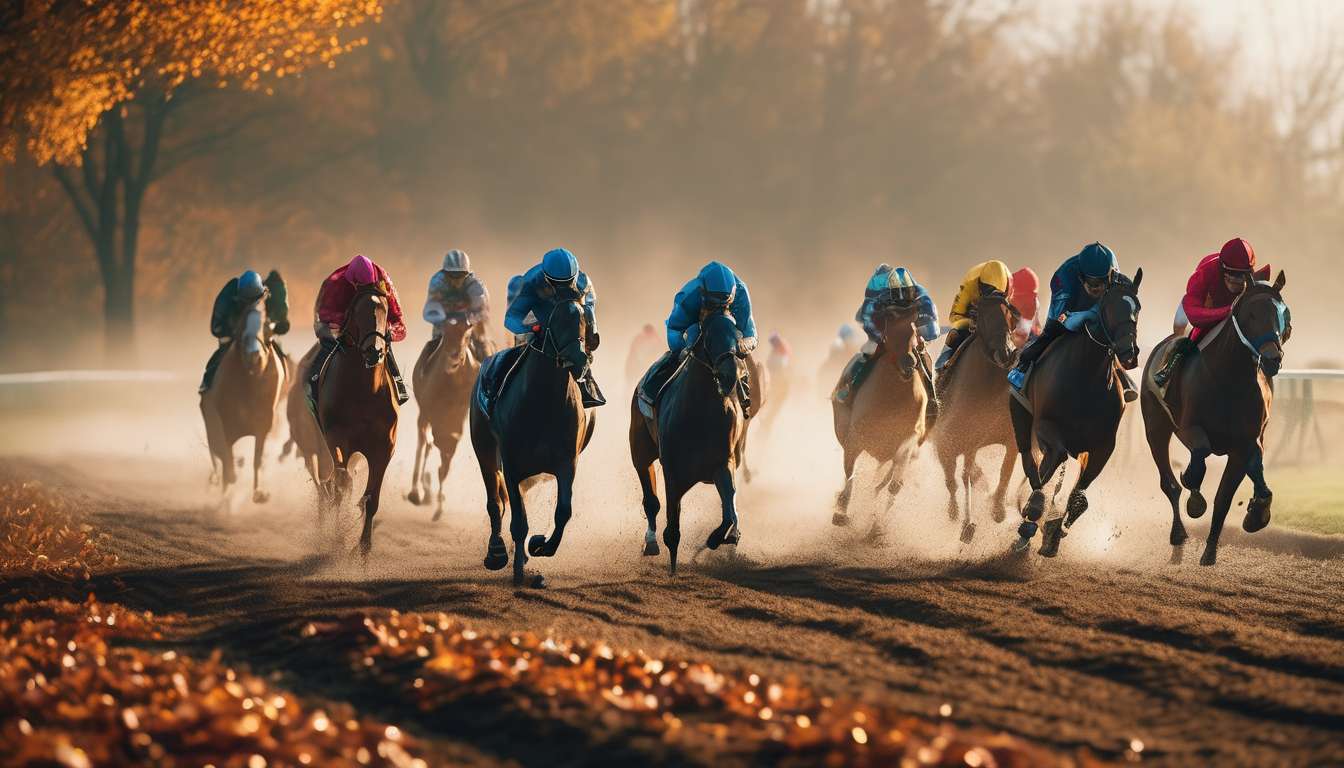As seasoned enthusiasts in the exhilarating world of horse racing, we know the thrill of the track and the rush of placing a well-informed bet. In our journey through countless race days, we’ve learned that success doesn’t come by chance; it requires preparation and strategy.
That’s why we’ve compiled our experiences into a comprehensive guide featuring seven essential pre-race checklists for making informed horse betting picks. Together, we’ll navigate the intricacies of:
- Form guides
- Track conditions
- Jockey statistics
By sharing these checklists, we aim to elevate our collective understanding of the sport, turning each race day into an opportunity for both enjoyment and potential profit.
Whether we’re seasoned bettors or newcomers eager to learn, these checklists will serve as our roadmap to making smarter, more confident bets. Let’s embark on this journey together and uncover the secrets to successful horse betting.
Analyzing Past Performances
Analyzing Past Performances
Analyzing past performances is crucial because it helps us identify patterns and predict a horse’s potential success in upcoming races. By examining historical data, we gain insights into how a horse has performed under various conditions. This shared knowledge brings us closer as a community of enthusiasts, enabling us to make more informed bets.
Influence on Betting Decisions
Let’s take a deeper look at how past performances influence our betting decisions:
- Race Distances: Analyzing how a horse performs at different race lengths.
- Track Surfaces: Understanding a horse’s performance on turf, dirt, or synthetic tracks.
- Weather Conditions: Evaluating the impact of weather on past race outcomes.
When combined with trainer records, these factors provide insights into a horse’s likely performance. Trainer reputations can also influence betting odds, so understanding their track record alongside a horse’s past performances creates a fuller picture.
Community and Camaraderie
By sharing our findings, we foster a sense of camaraderie. Each insight strengthens our collective ability to anticipate outcomes. Together, we’re not just betting; we’re engaging in a shared pursuit of understanding and success.
Evaluating Trainer Records
Analyzing how trainers prepare their horses for races gives us critical insights into potential performance outcomes. We dive into trainer records, examining their history with different horses and racing conditions. It’s like joining a community of horse racing enthusiasts who value the importance of understanding every element influencing a race.
When we look at past performances, we observe patterns in a trainer’s success rate, which often correlates with the betting odds. A trainer with a strong record might consistently produce horses that outperform expectations, providing us an edge in predicting potential winners.
We’re not just looking at the numbers; we’re connecting with the stories behind those numbers, understanding how a trainer’s strategy and expertise can impact a race.
By evaluating trainer records, we build a foundation of knowledge that strengthens our betting decisions. Together, we embrace the thrill of the race, knowing our insights into trainer performance can make all the difference in our betting journey.
Studying Recent Form
Let’s dive into the recent form of horses, where we can uncover patterns that might reveal their readiness to compete. By examining past performances, we gain insight into how a horse has been running lately. Are they improving, or showing signs of fatigue? This helps us predict if they’ll shine on race day.
Trainer records are another important factor to consider. A skilled trainer can significantly impact a horse’s condition and performance. By understanding which trainers have a history of turning out winners, we can feel more confident in our selections.
Betting odds reflect the general public’s perception of a horse’s chances. However, we shouldn’t rely solely on these numbers. Instead, let’s use them as a guide alongside our analysis of recent form and trainer records.
When we combine all this information, we create a solid foundation for our betting choices, fostering a sense of camaraderie among us bettors as we anticipate the thrill of the race together.
Understanding Class Levels
Understanding class levels is crucial in horse betting because it helps us gauge the quality of competition each horse has faced. By analyzing past performances, we can determine how horses have fared against different levels of competition. This insight allows us to predict how they might perform in their current race. It’s like being part of a community that knows the inside scoop, giving us an edge.
We shouldn’t overlook trainer records, either. They reveal patterns in how trainers manage horses across various class levels. Some trainers excel at elevating horses to higher classes, while others consistently win in lower tiers. These patterns can influence betting odds, and understanding them connects us with a more informed betting circle.
While reviewing class levels, we must consider betting odds. They often reflect public perception and can hint at a horse’s perceived class. By combining this with our analysis of past performances and trainer records, we join a savvy group of bettors who make informed decisions.
Checking Track Preferences
When betting on horse races, it’s essential to consider each horse’s track preferences to gauge their potential performance. Understanding how a horse performs on different track surfaces can be our ticket to the winning circle.
By delving into past performances, we can identify patterns that indicate a horse’s affinity for various track types:
- Dirt
- Turf
- Synthetic tracks
Trainer records are another crucial element in our analysis. Some trainers specialize in preparing horses for specific track conditions, and their expertise can significantly influence a horse’s performance.
Being aware of these details can give us a competitive edge when placing our bets.
Moreover, we must keep an eye on the betting odds, which often reflect the collective wisdom of the crowd. Odds can shift based on track conditions, so staying informed helps us make smart decisions.
Let’s be thorough in our evaluations and increase our chances of celebrating a successful bet together!
Reviewing Jockey-Horse Compatibility
Evaluating the synergy between jockeys and horses is critical to predicting race outcomes effectively. When we dive into past performances, we gain insights into which jockeys have consistently brought out the best in their mounts.
By examining trainer records, we can see which trainers have a knack for pairing the right jockey with the right horse. This information is invaluable because it helps us understand not just the individual talents, but how well they mesh together as a team.
Consider betting odds, as they often reflect the collective wisdom of the betting community. Odds can indicate how the public perceives a jockey-horse duo’s compatibility. However, relying solely on them isn’t enough.
To make informed decisions, we need to:
- Dig deeper into data and trends.
- Uncover hidden gems that others might overlook.
As a community of horse racing enthusiasts, we thrive on sharing knowledge and insights. By pooling our understanding of jockey-horse compatibility, we enhance our chances for betting success.
Assessing Race Conditions
Understanding race conditions is crucial for making informed betting decisions. As a community of horse racing enthusiasts, we’ve learned that examining various factors can significantly impact a horse’s performance. These factors include:
- Track conditions
- Weather
- Distance
Analyzing Past Performances:
By analyzing past performances, we can identify which horses excel under specific conditions:
- Some horses might thrive on muddy tracks.
- Others perform better in dry weather.
Looking at these performances helps us gain insights into how a horse might handle the current race.
Trainer Records:
Trainer records also play a vital role in assessing race conditions. Some trainers specialize in preparing horses for certain types of races or conditions. By reviewing these records, we can:
- Identify patterns
- Predict how well a horse is likely to perform
We understand that the relationship between a horse and its trainer can be just as important as the horse’s own capabilities.
With this knowledge, we can approach the betting odds with confidence, knowing we’ve done our homework on race conditions.
Considering Betting Odds
Understanding Betting Odds
When considering betting odds, it’s essential to evaluate how they reflect the collective expectations of bettors and experts. Betting odds offer a snapshot of the racing community’s confidence in each horse, which aids in making informed decisions.
Analyzing Key Factors
To make accurate assessments, it’s crucial to dive into the details:
- Past Performances: These reveal a horse’s consistency and ability to handle different track conditions.
- Trainer Records: Highlight the expertise and strategies that could influence a race’s outcome.
By analyzing these factors, we can gain insights into whether a horse is undervalued or overvalued.
Becoming Engaged Participants
By correlating these factors with the current betting odds, we become more than just casual spectators; we become engaged participants in the racing narrative. This deeper understanding allows us to feel like part of the horse racing community.
Conclusion
Remember, betting odds are not just numbers—they’re a reflection of collective wisdom. By understanding them alongside past performances and trainer records, we enhance our chances of making successful betting picks.
How can I develop a personal betting strategy for horse racing?
Developing a Personal Betting Strategy for Horse Racing
To create a successful betting strategy for horse racing, it is essential to first understand the basics of handicapping. This involves several key components:
- Analyzing Past Performances: Study the historical performance of horses to identify patterns or trends.
- Track Conditions: Consider how different track conditions might affect the performance of the horses.
- Jockey and Trainer Stats: Evaluate the success rates and experience of jockeys and trainers involved.
Establishing Goals and Limits
- Set Clear Goals: Define what you aim to achieve with your betting, such as specific profit targets or learning objectives.
- Determine Limits: Establish how much you are willing to bet and potentially lose to maintain discipline and avoid emotional betting.
Regular Review and Adjustment
- Continuously review the outcomes of your bets.
- Adjust your strategy based on the results and insights gained.
Dedication and Practice
With a commitment to learning and refining your approach, you can enhance your horse betting strategy over time. Regularly practicing these steps will help you develop a more sophisticated and effective method for betting on horse races.
What are the common mistakes to avoid when placing bets on horse races?
When placing bets on horse races, it’s crucial to steer clear of common mistakes to enhance your chances of success.
Key mistakes to avoid include:
-
Emotional Decisions: Avoid making bets based on emotions rather than logic and data.
-
Lack of Research: Ensure you thoroughly research the horses, jockeys, track conditions, and past performance before placing a bet.
-
Neglecting to Set a Budget: Always set a clear budget for your bets to avoid overspending and manage your finances responsibly.
-
Following the Crowd Blindly: Resist the urge to follow popular opinion without your own analysis, as herd mentality can lead to poor decisions.
-
Falling for Unreliable Tips: Be wary of tips from unreliable sources and validate information independently.
By focusing on the following strategies, you can improve your betting experience:
-
Stay Disciplined: Stick to your research and strategy without deviating due to impulse or peer pressure.
-
Stay Informed: Continuously update your knowledge about the horses and races to make informed decisions.
-
Focus on Strategy: Develop and adhere to a well-thought-out betting strategy tailored to your goals and risk tolerance.
By staying disciplined, informed, and focused on strategy, you can increase your chances of making successful bets and truly enjoy the thrill of horse racing.
How can I manage my bankroll effectively when betting on horse races?
When betting on horse races, managing your bankroll effectively is essential:
-
Set a Budget: Determine how much money you are willing to spend on betting and stick to that amount.
-
Track Wins and Losses: Keep a detailed record of all your bets to understand your performance.
-
Adjust Bets Accordingly: Use the information from your tracking to make informed adjustments to your betting strategy.
Avoid Chasing Losses:
- Do not increase your bets impulsively in an attempt to recover from losses.
- Steer clear of emotional betting, which can lead to poor decision-making.
Focus on Strategic Decisions:
- Base your bets on thorough research and analysis rather than gut feelings.
- Make informed choices to increase the likelihood of success.
By staying disciplined and adhering to these principles, you can ensure your bankroll lasts longer, thereby maximizing your chances of success in horse race betting.
Conclusion
In conclusion, remember to utilize these 7 pre-race checklists when making your horse betting picks:
-
Analyze Past Performances
Reviewing how a horse has performed in previous races can provide insight into its current capabilities. -
Evaluate Trainer Records
A trainer’s past success can often predict future performance. Look for trainers with a strong track record. -
Study Recent Form
Consider how the horse has been performing lately, as recent form is often a good indicator of current condition. -
Understand Class Levels
Different races have varying levels of competition. Ensure the horse is competing at an appropriate level. -
Track Preferences
Some horses perform better on certain types of tracks. Know the track conditions and match them to the horse’s strengths. -
Jockey-Horse Compatibility
A good rapport between jockey and horse can significantly impact performance. Check for past successful partnerships. -
Race Conditions
Factors such as weather and track surface can affect race outcomes. Adjust your choices based on these conditions.
Don’t forget to keep an eye on the betting odds to maximize your chances of success.
Happy betting!




